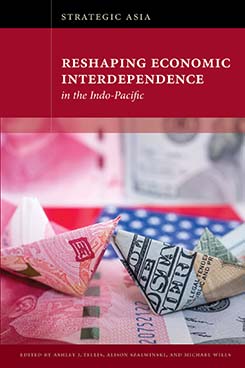India’s Reluctant Participation in the Evolving Indo-Pacific Economic Architecture
This chapter examines how India, contrary to its ambition to be an important strategic player in the Indo-Pacific, has been a reluctant participant in the region’s emerging economic architecture and argues that decoupling from China could be harmful for the Indian economy.
EXECUTIVE SUMMARY
MAIN ARGUMENT
The Indian economy has expanded significantly in the last 25 years and become more integrated with other Asian economies. Although trade links between India and China have also multiplied, investment and connectivity links are still limited. To improve their global value chains, most Asian economies are integrating with China and participating in mega trade deals like the Regional Comprehensive Economic Partnership and Comprehensive and Progressive Agreement for Trans-Pacific Partnership. These agreements will affect India even if it is not participating in them. Therefore, India must either join this emerging economic architecture or help create an entirely new one. Thus far, New Delhi’s quest for greater strategic influence is not matched by confident foreign economic policies. Instead of framing its economic ties with China in terms of “decoupling” or “de-risking,” India needs to develop an independent economic strategy to strengthen its linkages within the Indo-Pacific region, including with the Chinese economy. Reluctant participation in the emerging economic architecture and decoupling from China will likely be a self-defeating strategy.
POLICY IMPLICATIONS
- India’s strategic importance in the Indo-Pacific depends on its ability to integrate itself economically within the region, in terms of both trade and connectivity.
- The improvement of India’s manufacturing capacity and exports is crucial for the success of its external economic policy initiatives.
- Serious decoupling from China could be counterproductive for India in terms of both domestic manufacturing and exports.
Gulshan Sachdeva is a Professor and Jean Monnet Chair at the Centre for European Studies in the School of International Studies at Jawaharlal Nehru University in New Delhi.
Strategic Asia
The Strategic Asia annual edited volume incorporates assessments of economic, political, and military trends and focuses on the strategies that drive policy in the region. Learn more about Strategic Asia.



